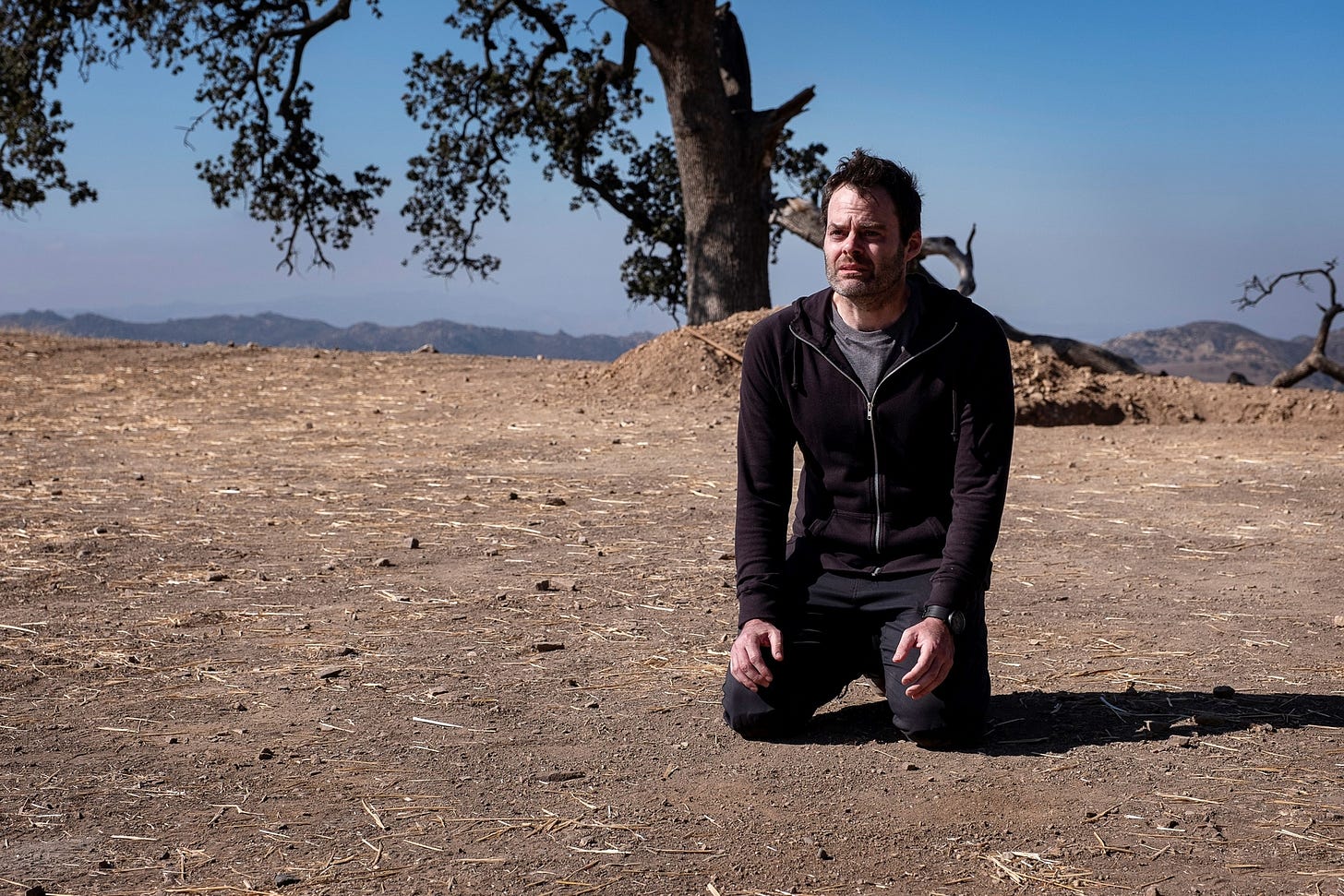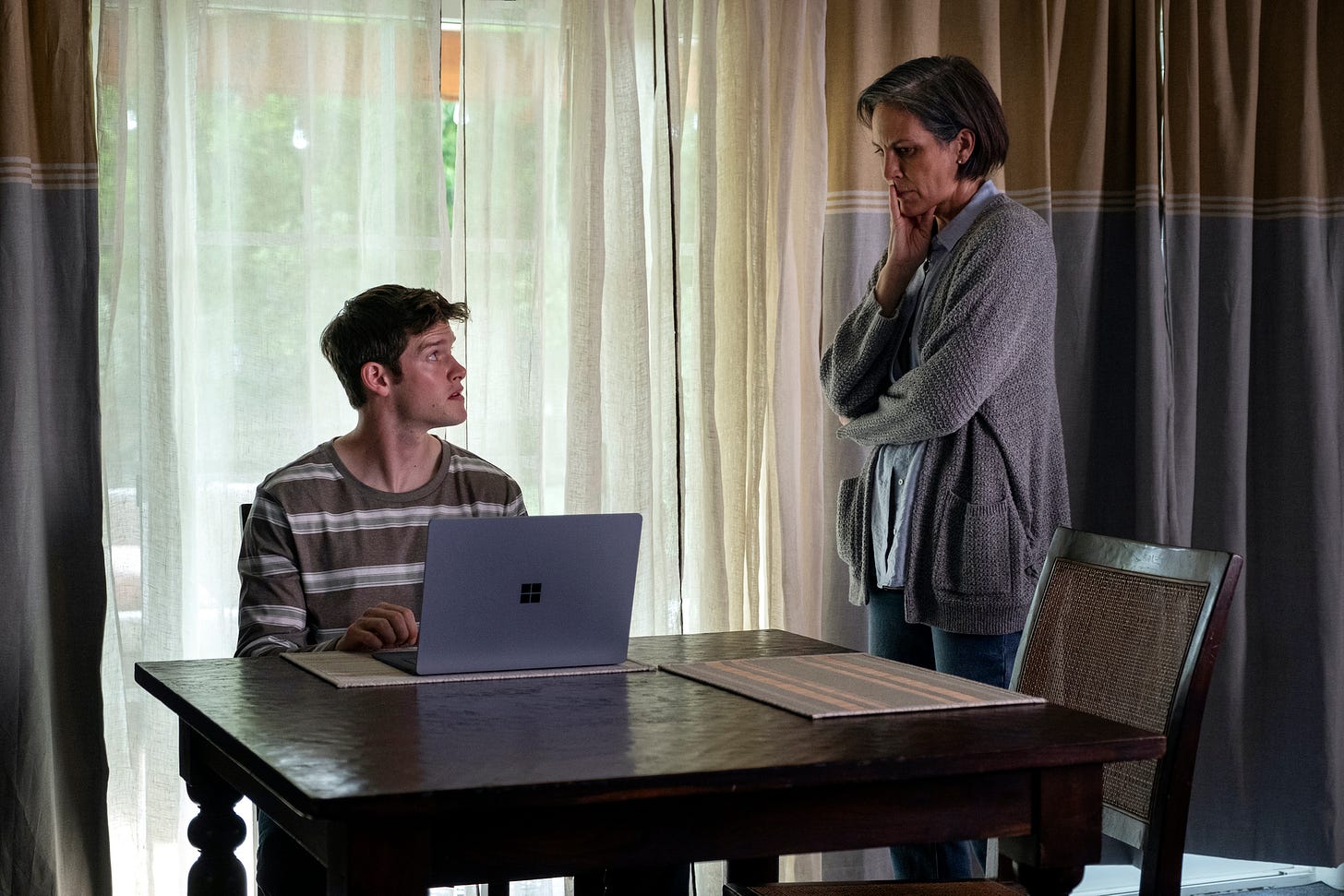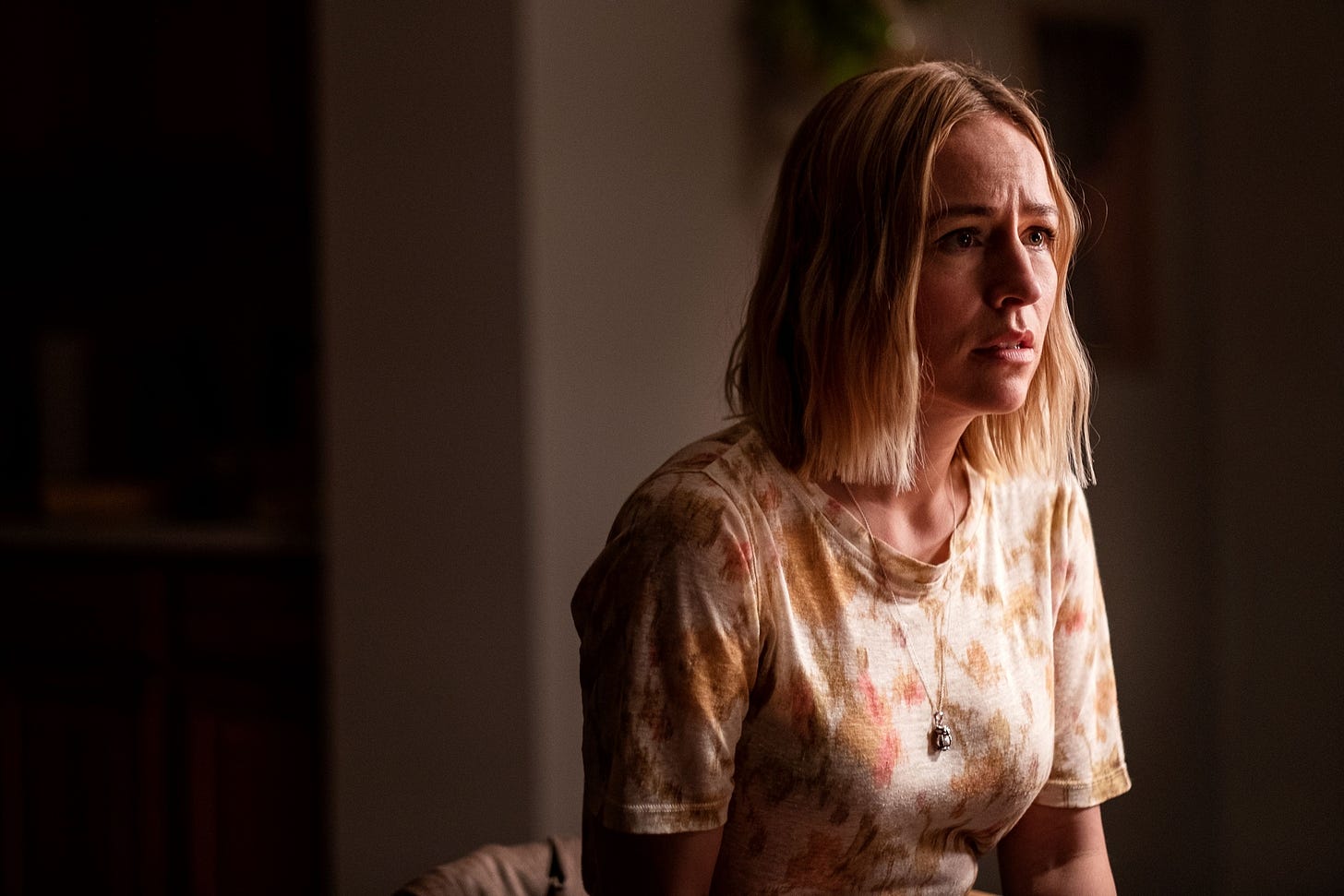Episodic Reflections: Barry, Season Three
Thoughts on the chaos of the HBO series' recently-concluded season
[Editor’s Note: I know Barry was one of the shows that people were watching that we weren’t covering, and it just so happens that our own Zack Handlen tweeted about catching up on the entire series over the past couple of weeks. This meant he tweeted himself into this assignment, which I hope gives y’all a chance to discuss your feelings on the season as a whole]
You listen to Bill Hader talking in interviews about the third season of Barry, and he states at least one theme of the season straight out: consequences. It’s there right from the start, as the first episode picks up with Barry’s beloved mentor, Gene Cousineau, trying and failing to capture Barry for the murder of Janice Ross all the way back in the finale of season one. But dramatic consequences are easy. It’s one of the ways to push a narrative forward–you need to find a new angle to create pressure on your antagonist? Why not have their past deeds come back to haunt them. Why not take a lie and push it into the light.
One of season three’s more interesting ideas, one that I’m still having a little trouble wrapping my head around, is how those consequences aren’t always direct. As convoluted as the path technically is from Barry killing to Janice to Gene ending up in the trunk of Barry’s car, there’s still a clear throughline, going all the way back to Barry stumbling into Gene’s acting class at the start of the series. You can write it out on a chart, the same way you could chart out characters’ fates on Breaking Bad. It’s an immensely satisfying approach to television, because it takes one of the medium’s great strengths–watching people over an extended period of time in a persistent world–and uses it to make that world feel more real. In a movie, the chain of events is usually relatively short. On TV, it can last for literal years.
But again, though: that idea that consequences aren’t always direct. Take Julie and Kyle. In episode 4, “all the sauces,” Fuches (who might as well be Consequence’s inadvertent avatar this season) starts getting in touch with the surviving loved ones of Barry’s victims. Julie (Annabeth Gish) turns out to be the wife of the corpse from the very first season of the series, the dead guy in the hotel room when Barry can’t find his keys. That scene in its original iteration was darkly comic, a neat, brutal way to establish Barry’s line of work, and his general numbness to the act of murder. The dead guy didn’t matter, apart from the fact that he was dead. In “all the sauces,” though, we learn he has a wife and a son, both of whom loved him, and both of whom are devastated by his loss. When Fuches reaches out, they learn the cause of their misery and decide to take the law into their own hands.
So far, so good, in terms of clear steps. But when it comes time to do the deed, things go awry, and not in a way you’d expect; the two follow Barry around the city, arguing about the plan, and when they finally track him down to an isolated place, Julie accidentally shoots her son in the stomach. She then does an immediate u-turn and speeds away, presumably to a hospital and a whole lot of awkward questions.
In the usual design of the show (and of other shows that work on this sort of merciless logic), this would have some impact on Barry’s life. For right now, it doesn’t; Barry hears the gunshot and watches the car speed away, mystified, and then the story moves. It’s a kind of consequence–if Barry hadn’t killed a certain man, Kyle wouldn’t have gotten shot–but there’s a chaos here that isn’t the same as Fuches’s path. Julie and Kyle don’t add anything to the plot, and once they speed away, we don’t hear from them again this season. The show still embraces the “if A, then B, all the way to Z” approach in its overarching narrative, as the season’s conclusion, which finds Barry falling into a trap and finally, shockingly, getting arrested for his crimes, is a very neat, very clean piece of writing. But it’s also introducing the unsettling idea that part of the horror of Barry’s actions is how unpredictably his crimes can leave their impression on the lives he touches, in ways that he’ll never really know.
It’s not a new idea to this kind of show; the second season of Breaking Bad quite famously revolves around a large scale version of just how rapidly and unpredictably violent, selfish behavior can spiral outward. But Barry’s third season keeps leaning into that concept of chaos, without the satisfaction of feeling like you’ve solved a puzzle when you decipher the clues and see the picture as a whole. For Julie and Kyle, there is no real “picture as a whole.” It’s just a lot of stupid, awful misery; a misery that Barry is still, on some level responsible for, even has he desperately tries to extricate himself from it.
That wild card energy also sinks into the behavior of the show’s major characters. Barry’s bursts of frustrated rage were the most obvious evidence of his instability this season, and Hader deserves considerable praise for never making the character’s rants look cool or in control or badass. (The closest we got was the season 2 finale where he went after Fuches, but even that seemed less like a cool dude shooting people than a broken machine incapable of doing anything else.) There’s an inherent petulance to Barry’s fury, a childishness that helps to make the outrage at once more pathetic and more frightening. When he lashes out at Sally when she refuses to cast Gene on her show, it’s hard to imagine anyone taking his rant out of context for badass points, ala Walter White’s infamous “I am the one who knocks” speech. He’s just an emotionally stunted, supremely selfish child who’s allowed his wounds to give him carte blanche to put his own needs above everyone else’s.
Still, that wasn’t exactly surprising; as well-acted and engaging as it is, this has been in the cards from the beginning. It’s Sally’s rise and fall that best exemplified that kind of free-wheeling entropy, that reminder that trauma doesn’t operate on a straight throughline. The start of the season has her at an artistic and professional peak, writing, directing, and starring in a pilot for a series that uses her experience as an abused wife in a way she appears to find fulfilling. A successful evening of rapturous praise, and some timely advice from her younger co-star, allows her to recognize the toxicity of her relationship with Barry, dropping him for his behavior after briefly falling back into the old desperate-to-please patterns that are some of the hallmarks of abuse.
But then the wheels come off. Her show is quickly canceled when it fails to reach the right demographic, she’s slotted into a writer’s room for a show she doesn’t respect (with an asshole male showrunner), and then she discovers that Natalie, her former assistant (and one time classmate) has got her own show up and running, a sitcom that sounds suspiciously like a comedy version of Sally’s own canceled series. Sally corners Natalie in an elevator and more or less explodes, ranting about her selfishness, cursing her, clearly out of control in a way we’ve never really seen from her. Natalie records the explosion and posts it online; in the ensuing fallout, Sally loses her writer’s job and fires her agent, refusing to admit that she’s crossed a line.
All of this happens fairly quickly–the show’s half-hour runtimes, which are generally a strength, can sometimes strip character arcs down to the bone, and it might have been more effective if we’d had a little more time to watch Sally’s rage build. As is, it’s completely shocking, a person who’s lost complete control over herself; much the same way Barry lost control earlier in the season and ranted at her. (The sequences are even shot in similar ways, most particularly when Sally gets right up in Natalie’s face, much the same way Barry got up in hers.) In case the connection isn’t obvious, we later see Sally framed by darkness as she turns her back on Lindsay and refuses to admit she’d made a mistake. And in case that didn’t make it clear, we later see her approaching Barry directly to ask him to do to Natalie what he’d earlier offered to do to an exec at the streaming service that had just canceled her show—an offer which, at the time, had completely (and rightly) horrified her.
The effect is obvious: Sally more or less burns every bridge behind her. But the causes are a little trickier to spot. Barry’s rant pushed her back into behavior she’d thought she’d put behind her, and while she was able to spot the danger and get out of the relationship, it wasn’t enough; part of the horror of trauma is that it often affects our behavior when we are at our most vulnerable and incapable of coherently handling its impact. When Sally was on top of the world, when everything was going her way, she had the self-confidence needed to hear a warning and take it to heart. But when bad luck, through no fault of her own, took that away, whatever progress she made was lost as well. It’s like Barry’s promise to never kill again “starting now.” Until you deal with the problem, until you actually take the steps, you're not starting anything, because you never stopped in the first place.
Barry’s third season was messier than its first and second, due in large part to the writers’ interest in not treating any major character’s experience as trivial. The cast spent large parts of the season working through disparate storylines, and the result is something that occasionally threatened to get lost in itself. But that interest in seeing everything through, following all different kinds of consequences, allowed the show to explore ideas in new and exciting ways, as well as offering up some of the best shot, best directed setpieces on television.







This season was somehow the least satisfying and most interesting season so far. I haven't watched the show since season 2 and honestly missed a lot of the plot details, I think a rewatch of all three seasons might help it click better for me. That said, I'm looking forward to season 4 with no idea of what they are doing.
This article helped to articulate, for me, why the season was a B+ and not an A- — to use the old AVClub grade system. Another aspect of the messiness is, in my opinion, Albert’s involvement. So much of the season built to the importance of his involvement and, in the end, his big scene is negated almost immediately. I’m sure there’s some intentionality in that decision, but it didn’t quite work for me. (Also, Chris’ widow, almost killing Barry but not finishing the job.)
I love NoHo Hank, and Carrigan’s performance, especially, but the show’s use of organized crime mostly as a punchline has always fallen flat. I like the character, but it has always been tedious to spend time in his world. The show has been much sharper in its Hollywood satire. Sally and Natalie and Sally’s younger co-star are the secret MVPs of the season. That story kept me watching every week.
I think I would be cheering Barry season 3 if it kept the focus on Gene/Barry for the whole season, rather than abandoning that dynamic for half the season and then circling back to it at the end. Still a very good run of eight episode. But, purely from a story standpoint, there were some weak points.